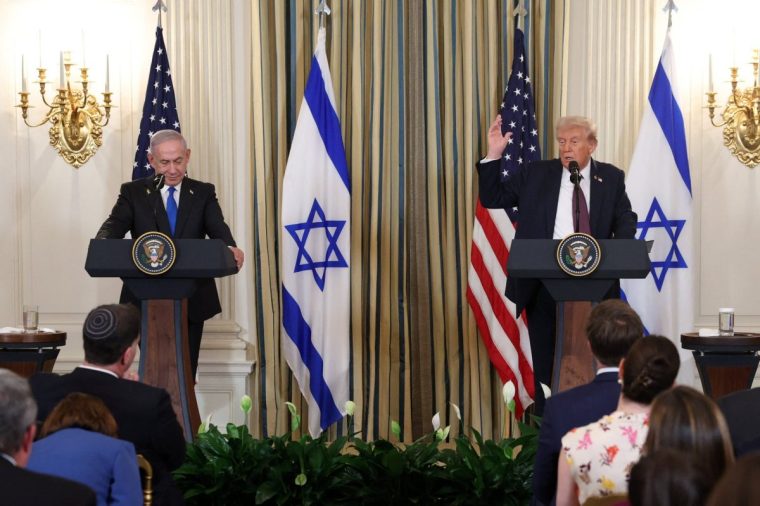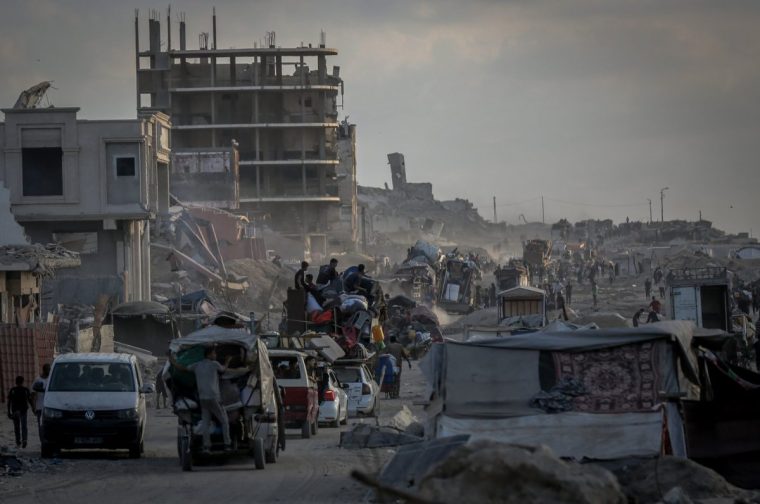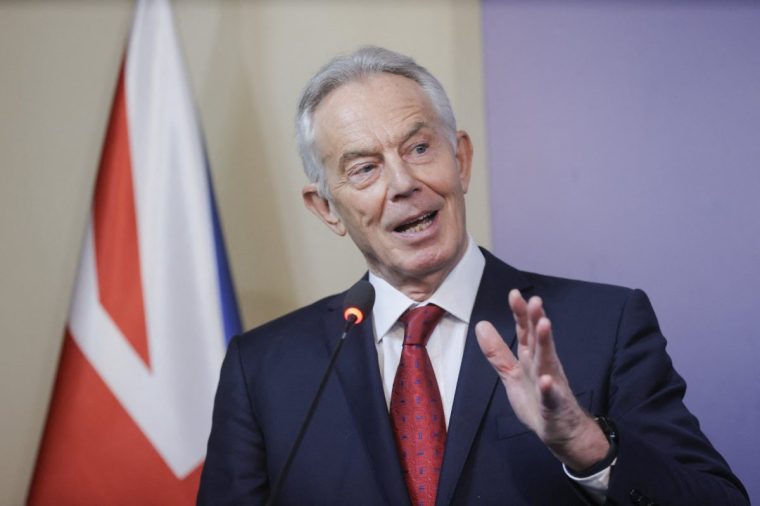Hamas has been presented with an ultimatum between accepting ‘humiliating defeat’ or being destroyed, one expert tells The i Paper
Hamas is leaning towards rejecting Donald Trump’s Gaza proposal, according to a report, casting doubt on the prospect of peace after nearly two years of bloody conflict.
The militant group is opposed to the 20-point plan, unveiled by Trump and Benjamin Netanyahu in the White House on Monday, because it “serves Israel’s interests” and “ignores those of the Palestinian people”, the BBC reported, citing a senior Hamas official.
Netanyahu has already declared Israel’s support for the US proposal, calling it a “critical step” towards peace in Gaza and the Middle East more widely.
Trump said the US would back Israel’s efforts to “finish the job” of destroying Hamas if it rejected the plan.
But the Hamas official told the BBC it was unlikely to agree to disarming and handing over weapons – a key condition of the peace plan – or to handing over the hostages (its only bargaining chip) in one go.
However, another report suggested some of Hamas’ leading members were leaning towards accepting the deal. According to CBS News, the group will present its response to mediators on Wednesday.
Fawaz Gerges, professor of international relations at LSE, told The i Paper the deal was “not a ceasefire proposal, or a peace plan”, but an “ultimatum for Hamas to surrender or be destroyed”.
Under the plan, the United States would work with Arab and international partners to develop a temporary International Stabilisation Force (ISF) to immediately deploy in Gaza. The ISF will train and provide support to vetted Palestinian police forces in Gaza, under the consultation of Jordan and Egypt.
But Hamas is also said to object to the deployment of the ISF in Gaza, which it views as a new form of occupation, according to the BBC.
The plan would facilitate the release of all Israeli hostages within 72 hours, with Israel subsequently freeing 250 Palestinian prisoners serving life sentences, along with 1,700 people detained since October, 2023, including all women and children.

Aid would also enter the territory, with its distribution overseen by the United Nations and other agencies that are linked to neither Hamas nor Israel.
Gaza would be governed by a “temporary transitional governance of a technocratic, apolitical Palestinian committee, responsible for delivering the day-to-day running of public services and municipalities”, according to the plan’s text, released by the White House.
This committee will be “made up of qualified Palestinians and international experts”. It will be overseen and supervised by a “new international transitional body”, dubbed the “Board of Peace”, which would be headed by Trump and include former UK prime minister Sir Tony Blair”.
While acknowledging a peace deal was an opportunity to end “two years of extremely bloody conflict”, several experts have raised concerns about the proposal’s implications, and cast doubt on the prospect of it being adopted by Hamas.
Plan could not lead to two-state solution:
Gerges explained that Hamas was not only under pressure by the “ultimatum of the US and Israel but also of global support for the plan, including from most Arab and Muslim states”, adding that these states wanted “the war over with in order to stop the massacres in Gaza, because they are worried about the political implications at home”.
He said: “There is considerable popular anger in most Arab and Muslim countries, particularly in Egypt, Turkey, Jordan and Morocco. Arab and Muslim public opinion want their governments to take a stronger position and stand up to Israel and the US, they want their governments to lend a helping hand to the persecuted Palestinians.
“Arab governments and Muslim governments are concerned over political instability at home if the war continues. It’s been a very alarming, concerning question for them – they want the war to end now, not tomorrow.”

But he said a “major challenge is that the Palestinian Authority will have no major role to play in running Gaza” under the plan.
“This is a major problem because now you will have separation between Gaza and the West Bank. That goes against the very notion of providing a pathway to the Palestinian state.”
The “Board of Peace” headed by Trump will “handle the funding for the redevelopment of Gaza until such time as the Palestinian Authority has completed its reform programme”.
“The PA is nominally running the West Bank – it doesn’t really have any authority – while Gaza will run by a transitional authority and led by Trump and Tony Blair,” Gerges said.
“Many Palestinians think that this is a new form of colonialism. Again, the Palestinian were neither consulted nor granted agency.”
Anne Irfan, lecturer in interdisciplinary race, gender and postcolonial studies at UCL, said she “can’t see any way in which this would facilitate a two-state solution”.
Irfan, who authored A Short History of the Gaza Strip, told The i Paper: “The Trump plan doesn’t say anything about the West Bank, which in territorial terms would be the largest part of the would-be Palestinian state within the two-state framework.
“Even setting that aside, if we just focus on Gaza, there’s nothing in the proposal that looks like an independent state. It says Gaza will be a de-radicalised, terror-free zone, which implies it will be demilitarised, but most understandings of a state imply it has some sort of military capacity or autonomy.
“Netanyahu has now explicitly said that he does not agree to a Palestinian state, which is another clear argument against any idea that this plan supports a two-state solution.”
She concluded that nothing in the plan “paves the way for Palestinian statehood – in fact I see the opposite, it paves the way for foreign occupation of Palestine by another name”.
Long-term eradication of Hamas ‘almost impossible’
Urban Coningham, research fellow at the Royal United Services Institute (Rusi), said any ceasefire would be “extremely positive, because it’s been two extremely bloody years”.
But he told The i Paper that “one of the key weaknesses” of the proposal was that it relied on “Netanyahu’s first goal of the conflict, which is to eradicate Hamas from the Gaza Strip”.

Coningham said this seemed “like an impossible goal”, predicting the plan would at best lead to a “temporary ceasefire”.
He explained: “The parts of the plan that make that possible is Hamas being entirely removed from Gaza and that Hamas militants who lay down their arms will be able to go to another country.
“There is not a single country in the Middle East that will accept Hamas militants or officials. It’s a complete pipe dream that this is going to happen.
He added that the problem for any temporary governing body in Gaza would be dealing “with the remnants of Hamas inside the Strip. People in Gaza have gone through two years of bloody conflict, starvation, not having access to healthcare. It’s very difficult to see a world in which Hamas will not have support and be able to recruit from people affected by this.
“I can’t see a world in which they lay down their arms and believe now that they equitable partners with the Israeli government and see this as a long-term lasting solution.”
Limited Palestinian agency and continued Israeli military control
Irfan and Gerges’s remarks were echoed by Vincent Fean, who served as British Consul General to Jerusalem between 2010 and 2014, and is currently a trustee of the Britain Palestine Project charity.
He told The i Paper: “Our government’s position is that the [Palestinian Authority] should return to administer Gaza now. That’s one way of affirming Palestinian agency. The idea of a Managing Board involving Trump, Blair and others smacks of neo-imperialism. Again, Palestinian agency is essential.
“Netanyahu opposes Palestinian statehood, so from the start there is a chasm between Israeli government intentions and the will of the international community. It is that consensus – minus Israel under Netanyahu – which needs to prevail. UK recognition of Palestine points in that direction.”
Fean cited “lack of Palestinian agency” in the plan, saying: “It is for Palestinians to govern Gaza, East Jerusalem and the rest of the West Bank – the territories occupied by Israel militarily in 1967. In July 2024, the International Court of Justice advised that that occupation is now ‘unlawful’, and must be ended as soon as possible.”
He added: “We need clear timelines to Palestinian governance of Gaza – and reunification economically and politically with the West Bank.”
“Last night was not a ceasefire proposal. It was an ultimatum for Hamas to surrender or be destroyed.
“The underlying premise behind what President Trump’s plan is that Hamas has been vanquished, Israel has won and has to cash in.”
